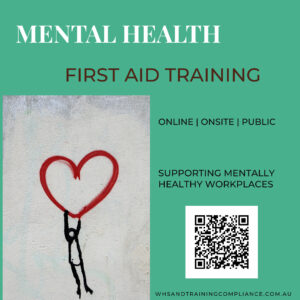In order to create a safe and healthy workplace, you have to recognise and promote within the workplace mental health. Both managers and workers can make the workplace a safe place, one where mental health problems won’t be created or exacerbated, and where workers with mental illnesses are supported. This article we will cover Powerful Self-Help Strategies to Balance Mental Health and benefits of mental health training within a workplace.
Self-help or self-care refers to the activities that we purposely select to engage in on a regular basis to preserve, enhance and improve our physical and mental health. Self-care is also essential for building resilience towards the stressor in life. We will be better equipped to live our life to the best, if we take steps to care for our mind and body. Identifying the activities and practices that support personal wellbeing and assist everyone to sustain positive self-care in the long-term. In this article, we explain the mental health and list of self-help strategies.
Understanding Mental Health
Mental health is the makeup of our emotional, psychological, and social well-being. It reflects how we think, feel, and act. It also helps us to determine how we handle stress, maintain relationships with other people, and make particular choices in life. It has significant importance at every phase of life from childhood to adolescence and teenage years till throughout adulthood.
Many factors can cause mental health problems:
• Biological and hereditary factors related to genes, physical health or brain chemistry
• Early Life adverse experiences, such as trauma or abuse
• Family history such as past incidences in family members
• Environment such as poverty, financial situation or isolation.
Warning signs of ill health
Experiencing one or more of the following feelings or behaviours can be a warning sign for developing mental health problems:
• Too much or no eating
• Poor sleeping habits such as no sleep or too much
• Moving away from people and hobbies and routine activities
• Lethargy or feeling of having low or no energy
• Distantness or empty feeling
• Having unexplained pains such as headache, stomach and/or back aches
• Helplessness or hopelessness
• Addiction to substances such as tobacco, alcohol or other
• Misperception, absentmindedness
• Anxiety, fear, and panic attacks
• Irritability such as yelling, arguing or fighting with others
• Experiencing severe mood swings causing the disturbance in relationships
• Persistent thoughts and memories
• Hearing voices or believing things that are not real or true
• Thinking about suicide or non-suicidal self-injury
• Inability to carry out routine activities tasks like taking care of kids or getting to work or school.
5 Powerful Self-Help Strategies to maintain good mental health
1. Realise and raise your value
Try to love yourselves and treat yourselves with due kindness and respect. Most importantly avoid self-criticism. Ensure that you have time for your hobbies and activities that you enjoy a lot. Hobbies can be sports, gardening, music, learning languages. All these activities can raise one’s value and confidence and protect mental health.
2. Taking care of yourself
Taking care of yourself in the below manners can improve the mental health.
- Consume healthy and nutritious meals
- Avoid smoking and other substances such as drugs and alcohol
- Drink plenty of water and maintain hydration level
- Exercise and activities like yoga and meditation can reduce depression, anxiety and induce relaxation
- Get enough sleep and rest because lack of sleep results in depression.
3. Surround yourself with positive-minded and social people
People who are positive-minded with strong family or social connections have good mental health as compared to those who are negative-minded, staying aloof, or who lack social support. Make schedules or plan activities with supportive friends and family members and take opportunities, where you can meet new people like in a group, club, or class. Sometimes when it is not possible to meet them personally, make sure you are connected with them digitally.
4. Learn how to deal with stress
Stress is a part of life. It is difficult to eliminate it but at least we can reduce it to the minimum to avoid any adverse effects it produces. Good planning and scheduling of our work and daily activities can reduce stress to a great extent. Add humour, smile, and have a positive attitude in life. Laughter can boost the immune system; eases pain, relax the body and reduce stress.
5. Aim for smart targets and goals
Always set smart targets and goals (specific, measurable, achievable, realistic, time) and make sure that you decide on what you want to achieve academically, personally, and career-wise. Write down the goals and targets. It is not a bad deal to aim high but it is equally important to be realistic in life as unrealistic targets can lead to failure and mental health problems such as depression.
Mental health is a mirror and reflection of one’s self and the only way we can keep it healthy is self-realisation and strategies to protect our mental health.
Workplace mental health strategies: Why it’s important
Safe and healthy workplaces are good for business. Keeping your workplace safe and healthy means:
- Putting a stop to worker absences and high turnover
- Achieving higher staff loyalty and returns on training
- Bringing down stress levels and improving morale
- Keeping you out of court and fines for health and safety violations
- Save time and money by avoiding discrimination lawsuits
- Reducing industrial disputes.
Workplace Mental Health Training
Safety legislation advances, workplace mental health strategies improve, and workplace systems get better. Mental health training is one of the best ways to improve your mental health strategy. Businesses can enhance their safety and health performance and achieve greater results by providing employees with appropriate, consistent, and relevant mental health training.
The importance of mental health awareness, knowledge, skills, values, and assisting employees cannot be overstated. Employees can gain familiarity with workplace mental health as well as gain skills and knowledge about safety and health with mental health training.
Furthermore, training allows employees to gain mental health knowledge and improve their skills to become more productive, improves inclusiveness, and assists employers to support employees with mental health problems meaningfully.
Have you seen Mental Health First Aid training courses?
We provide onsite MHFA training across Australia.
If you would like to organise an onsite MHFA Training, Contact us and we will provide you assistance on onsite MHFA Training.
Talk to our expert trainer Sebnem Bulan-Worth , she is a “Principal Master MHFA Instructor”, who conducted over 200 MHFA training Call Sebnem Bulan-Worth Now! 0754 992 406
Check out our Training Calendar
Access Mental Health Awareness Books from Amazon: Mental Health Books















